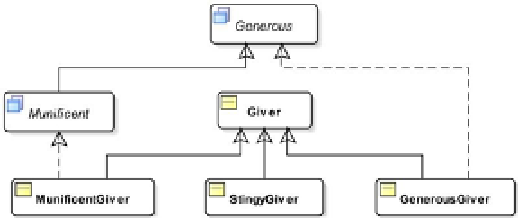Java Reference
In-Depth Information
The above class declaration will not compile. The class inherits the
sing()
,
play()
, and
setRate()
methods
without any conflicts. There are two choices to inherit the
getRate()
method:
Singer.getRate()
method
•
The abstract
Player.getRate()
method
None of the two versions of the
getRate()
method are more specific than others. In this case, the
MultiTalented
class must override the
getRate()
method to resolve the conflict.
The following code for the
MultiTalented
class will compile. It overrides the
getRate()
method to resolve the
conflict. The method calls the default
getRate()
method of the
Player
interface and performs other logic. The class is
still declared abstract as it does not implemented abstract methods from the
Singer
and
Player
interfaces.
•
The default
public abstract class MultiTalented implements Singer, Player {
// A MultiTalented is paid the rate of a Player plus 200.00
@Override
public double getRate() {
// Get the default rate for a Player from the Player interafce
double playerRate = Player.super.getRate();
double rate = playerRate + 200.00;
return rate;
}
}
The instanceof Operator
You can use the
instanceof
operator to evaluate if a reference type variable refers to an object of a specific class or
its class implements a specific interface. It is a two-operand operator and it evaluates to a
boolean
value. The general
syntax of the
instanceof
operator is
<<referenceVariable>> instanceof <<referenceType>>
Let's consider the following snippet of code that defines interfaces
Generous
and
Munificent
, and classes
Giver
,
GenerousGiver
,
MunificentGiver
, and
StingyGiver
. Figure
17-2
shows a class diagram for these interfaces and classes.
Figure 17-2.
A class diagram showing the relationship between interfaces and classes: Generous, Munificent, Object,
Giver, GenerousGiver, MunificentGiver, and StingyGiver

